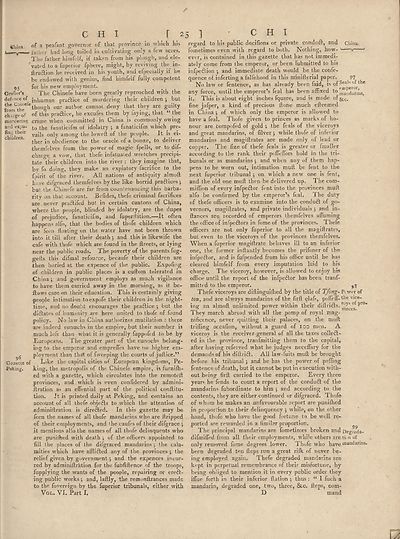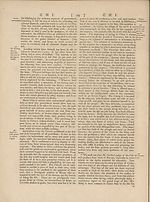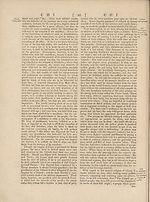Encyclopaedia Britannica, or, a Dictionary of arts, sciences, and miscellaneous literature : enlarged and improved. Illustrated with nearly six hundred engravings > Volume 6, CHI-Crystallization
(33) Page 25
Download files
Complete book:
Individual page:
Thumbnail gallery: Grid view | List view

CHI r 25 ] ' CHI
€hina °f a peafant governor of that province in which his
y, —y father had long toiled in cultivating only a few acres.
The father hirafelf, if taken from his plough, and ele¬
vated to a fuperiur fphere, might, by reviving the in-
ftru£lion he received in his youth, and efpecially it he
be endowed with genius, find himfeif fully competent
for his new employment.
Grower’s The Chinefe have been greatly reproached with the
defence of inhuman pradice of murdering their children j but
the G‘llnefethough our author cannot deny that they are guilty
ehTgeot of this pradiee, he excufes them by faying, that “ the
murdering crime when committed in China is commonly owing
and expo- to the fanaticifm of idolatry •, a fanaticifm which pre-
^klren^ va^s on^y atnung the loweft of the people. It is. ei-
c wren. ^er jn 0ht>dience to the oracle of a bonze, to deliver
themfelves from the power of magic fpells, or to dif-
charge a vow, that thefe infatuated wretches precipi¬
tate their children into the river: they imagine that,
bv fo doing, they make an expiatory facrifice to the
f;>irit of the river. All nations of antiquity almoft
have difgraced themfelves by the like horrid pradices ;
but the Chinefe are far from countenancing this barba¬
rity on that account. Befides, thefe criminal facrifices
are. never pradifed but in certain cantons of China,
where the people, blinded bv idolatry, are the dupes
of prejudice, fanaticifm, and fuperllition.—It often
happens alfo, that the bodies of thofe children which
are feen floating on the water have not been thrown
into it till after their death ; and this is likewife the
cafe with thofe which are found in the ftreets, or lying
near the public roads. The poverty of the. parents fug-
gelts this difmal refource, becaufe their children are
then buried at the expence of the public. Expofing
of children in public places is a cuftom tolerated in
China •, and government employs as much vigilance
to have them carried away in the morning, as it be-
ftows care on their education. This is certainly giving
people intimation toexpofe their children in the. night¬
time, and no doubt encourages the pradice j but the
didates of humanity are here united to thofe of found
policy. No law in China authorizes mutilation : there
are indeed eunuchs in the empire, but their number is
much lei’s than what it is generally fuppoftd to be by
Europeans. The greater part of the eunuchs belong¬
ing to the emperor and empreffes have no higher em-
^ ployment than that of fweeping the courts of juft ice.”
Gazette of Like the capital cities of European kingdoms, Pe-
f'sking. king, the metropolis of the Chinefe empire, is furniih-
ed with a gazette, which circulates into the remoteft
provinces, and which is even confidered by admini-
ftration as an effential part of the political conftitu-
tion. It is printed daily at Peking, and contains an
account of all thefe objeds to which the attention of
adminiftration is direded. In this gazette may be
feen the names of all thofe mandarins who are ftripped
of their employments, and the caufes of their difgrace j
it mentions alio the names of all thofe delinquents who
are punilhed with death ; of the officers appointed to
fill the places of the difgraced mandarins 5 the cala¬
mities which have afflided any of the provinces ; the
relief given by government 5 and the expences incur¬
red by adminiftrktion for the fubfiftence of the troops,
fupplying the wants of the people, repairing or erod¬
ing public works •, and, laftly, the remonftrances made
to the fovereign bv the fuperior tribunals, either with
Vol. VI. Part I.
regard to his public decifioms or private condivd, and China.
fometimes even with regard to both. Nothing, how- v
ever, is contained in this gazette that has not immedi¬
ately come from the emperor, or been lubmitted to bis
infpedion •, and immediate death would be the confe-
quence of inferting a falfehood in this minifttrial paper. 97
No law or fentence, as has already been faid, i5 0f SeaK of the
any force, until the emperor’s feal has been affixed to ^naarms,
it. This is about eight inches fquare, and is made ofg£C>
fine jafper, a kind of precious ftone much efteemed
in China ; of which only the emperor is allowed to
have a feal. Thofe given to princes as marks of ho¬
nour are compofed of gold ; the feals of the viceroys
and great mandarins, of filver j while thofe of inferior
mandarins and magiftrates are made only of lead or
copper. The fize of thefe feals is greater or fmaller
according to the rank their poflefiors hold in the tri¬
bunals or as mandarins j and when any of them hap¬
pens to be worn out, intimation muft be fent to the
next fuperior tribunal on winch a new one is fent,
and the old one muft then be delivered up. The com-
miffion of every infpedtor fent into the provinces muft
alfo be confirmed by the emperor’s feal. The duty
of thefe officers is to examine into the conduft of go¬
vernors, magiftrates, and private individuals ; and in-
ftances are recorded of emperors themfelves affuming
the office of infpedlors in fome of the provinces. Thefe
officers are not only fuperior to all the magiftrates,
but even to the viceroys of the provinces themfelves.
When a fuperior magiftrate behaves ill to an inferior
one, the former inftantly becomes the prifoner of the
infpeiftor, and is fufpended from his office until he has
cleared himfeif from every imputation laid to his
charge. The viceroy, however, is allowed to enjoy his
office until the report of the infpeftor has been tranf-
mitted to the emperor.
Thefe viceroys are diftinguilhed by the title olTfong- Pi wer of
ton, and are always mandarins of the firft clafs, poflcfl- thevice-
ing an almoft unlimited power within their diftri&s.
They march abroad with all the pomp of royal mag¬
nificence, never quitting their palaces, on the molt
trifling occafion, without a guard of 100 men. A
viceroy is the receiver-general of all the taxes collect¬
ed in the province, tranfmitting them to the capital,
after having referved what he judges neceffary for the
demands of his diftriCl. All law-fuits muft be brought
before his tribunal j and he has the power of palling
fentence of death, but it cannot be put in execution with¬
out being firft carried to the emperor. Every three
years he fends to court a report of the conduCI of the
mandarins fubordinate to him *, and according to the
contents, they are either continued or difgraced. Thofe
of whom he makes an unfavourable report are puniftied
in proportion to their delinquency j while, on the other
hand, thofe who have the good fortune to be well re¬
ported are rewarded in a fimilar proportion. ^
The principal mandarins are fometimes broken and Degrada-
difmilTed from all their employments, while others are ti n of
only removed fotne degrees lower. Thofe who have inant'ar*ns*
been degraded ten fteps run a great rilk of never be¬
ing employed again. Thefe degraded mandarins are
kept in perpetual remembrance of their misfortune, by
being obliged to mention it in every public order they
iffue fort h in their inferior ftation •, thus : “ I fuch a
mandarin, degraded one, two, three, &c. fteps, com-
D mand
€hina °f a peafant governor of that province in which his
y, —y father had long toiled in cultivating only a few acres.
The father hirafelf, if taken from his plough, and ele¬
vated to a fuperiur fphere, might, by reviving the in-
ftru£lion he received in his youth, and efpecially it he
be endowed with genius, find himfeif fully competent
for his new employment.
Grower’s The Chinefe have been greatly reproached with the
defence of inhuman pradice of murdering their children j but
the G‘llnefethough our author cannot deny that they are guilty
ehTgeot of this pradiee, he excufes them by faying, that “ the
murdering crime when committed in China is commonly owing
and expo- to the fanaticifm of idolatry •, a fanaticifm which pre-
^klren^ va^s on^y atnung the loweft of the people. It is. ei-
c wren. ^er jn 0ht>dience to the oracle of a bonze, to deliver
themfelves from the power of magic fpells, or to dif-
charge a vow, that thefe infatuated wretches precipi¬
tate their children into the river: they imagine that,
bv fo doing, they make an expiatory facrifice to the
f;>irit of the river. All nations of antiquity almoft
have difgraced themfelves by the like horrid pradices ;
but the Chinefe are far from countenancing this barba¬
rity on that account. Befides, thefe criminal facrifices
are. never pradifed but in certain cantons of China,
where the people, blinded bv idolatry, are the dupes
of prejudice, fanaticifm, and fuperllition.—It often
happens alfo, that the bodies of thofe children which
are feen floating on the water have not been thrown
into it till after their death ; and this is likewife the
cafe with thofe which are found in the ftreets, or lying
near the public roads. The poverty of the. parents fug-
gelts this difmal refource, becaufe their children are
then buried at the expence of the public. Expofing
of children in public places is a cuftom tolerated in
China •, and government employs as much vigilance
to have them carried away in the morning, as it be-
ftows care on their education. This is certainly giving
people intimation toexpofe their children in the. night¬
time, and no doubt encourages the pradice j but the
didates of humanity are here united to thofe of found
policy. No law in China authorizes mutilation : there
are indeed eunuchs in the empire, but their number is
much lei’s than what it is generally fuppoftd to be by
Europeans. The greater part of the eunuchs belong¬
ing to the emperor and empreffes have no higher em-
^ ployment than that of fweeping the courts of juft ice.”
Gazette of Like the capital cities of European kingdoms, Pe-
f'sking. king, the metropolis of the Chinefe empire, is furniih-
ed with a gazette, which circulates into the remoteft
provinces, and which is even confidered by admini-
ftration as an effential part of the political conftitu-
tion. It is printed daily at Peking, and contains an
account of all thefe objeds to which the attention of
adminiftration is direded. In this gazette may be
feen the names of all thofe mandarins who are ftripped
of their employments, and the caufes of their difgrace j
it mentions alio the names of all thofe delinquents who
are punilhed with death ; of the officers appointed to
fill the places of the difgraced mandarins 5 the cala¬
mities which have afflided any of the provinces ; the
relief given by government 5 and the expences incur¬
red by adminiftrktion for the fubfiftence of the troops,
fupplying the wants of the people, repairing or erod¬
ing public works •, and, laftly, the remonftrances made
to the fovereign bv the fuperior tribunals, either with
Vol. VI. Part I.
regard to his public decifioms or private condivd, and China.
fometimes even with regard to both. Nothing, how- v
ever, is contained in this gazette that has not immedi¬
ately come from the emperor, or been lubmitted to bis
infpedion •, and immediate death would be the confe-
quence of inferting a falfehood in this minifttrial paper. 97
No law or fentence, as has already been faid, i5 0f SeaK of the
any force, until the emperor’s feal has been affixed to ^naarms,
it. This is about eight inches fquare, and is made ofg£C>
fine jafper, a kind of precious ftone much efteemed
in China ; of which only the emperor is allowed to
have a feal. Thofe given to princes as marks of ho¬
nour are compofed of gold ; the feals of the viceroys
and great mandarins, of filver j while thofe of inferior
mandarins and magiftrates are made only of lead or
copper. The fize of thefe feals is greater or fmaller
according to the rank their poflefiors hold in the tri¬
bunals or as mandarins j and when any of them hap¬
pens to be worn out, intimation muft be fent to the
next fuperior tribunal on winch a new one is fent,
and the old one muft then be delivered up. The com-
miffion of every infpedtor fent into the provinces muft
alfo be confirmed by the emperor’s feal. The duty
of thefe officers is to examine into the conduft of go¬
vernors, magiftrates, and private individuals ; and in-
ftances are recorded of emperors themfelves affuming
the office of infpedlors in fome of the provinces. Thefe
officers are not only fuperior to all the magiftrates,
but even to the viceroys of the provinces themfelves.
When a fuperior magiftrate behaves ill to an inferior
one, the former inftantly becomes the prifoner of the
infpeiftor, and is fufpended from his office until he has
cleared himfeif from every imputation laid to his
charge. The viceroy, however, is allowed to enjoy his
office until the report of the infpeftor has been tranf-
mitted to the emperor.
Thefe viceroys are diftinguilhed by the title olTfong- Pi wer of
ton, and are always mandarins of the firft clafs, poflcfl- thevice-
ing an almoft unlimited power within their diftri&s.
They march abroad with all the pomp of royal mag¬
nificence, never quitting their palaces, on the molt
trifling occafion, without a guard of 100 men. A
viceroy is the receiver-general of all the taxes collect¬
ed in the province, tranfmitting them to the capital,
after having referved what he judges neceffary for the
demands of his diftriCl. All law-fuits muft be brought
before his tribunal j and he has the power of palling
fentence of death, but it cannot be put in execution with¬
out being firft carried to the emperor. Every three
years he fends to court a report of the conduCI of the
mandarins fubordinate to him *, and according to the
contents, they are either continued or difgraced. Thofe
of whom he makes an unfavourable report are puniftied
in proportion to their delinquency j while, on the other
hand, thofe who have the good fortune to be well re¬
ported are rewarded in a fimilar proportion. ^
The principal mandarins are fometimes broken and Degrada-
difmilTed from all their employments, while others are ti n of
only removed fotne degrees lower. Thofe who have inant'ar*ns*
been degraded ten fteps run a great rilk of never be¬
ing employed again. Thefe degraded mandarins are
kept in perpetual remembrance of their misfortune, by
being obliged to mention it in every public order they
iffue fort h in their inferior ftation •, thus : “ I fuch a
mandarin, degraded one, two, three, &c. fteps, com-
D mand
Set display mode to:
![]() Universal Viewer |
Universal Viewer | ![]() Mirador |
Large image | Transcription
Mirador |
Large image | Transcription
Images and transcriptions on this page, including medium image downloads, may be used under the Creative Commons Attribution 4.0 International Licence unless otherwise stated. ![]()
| Permanent URL | https://digital.nls.uk/193007852 |
|---|
| Attribution and copyright: |
|
|---|
| Description | Ten editions of 'Encyclopaedia Britannica', issued from 1768-1903, in 231 volumes. Originally issued in 100 weekly parts (3 volumes) between 1768 and 1771 by publishers: Colin Macfarquhar and Andrew Bell (Edinburgh); editor: William Smellie: engraver: Andrew Bell. Expanded editions in the 19th century featured more volumes and contributions from leading experts in their fields. Managed and published in Edinburgh up to the 9th edition (25 volumes, from 1875-1889); the 10th edition (1902-1903) re-issued the 9th edition, with 11 supplementary volumes. |
|---|---|
| Additional NLS resources: |
|

